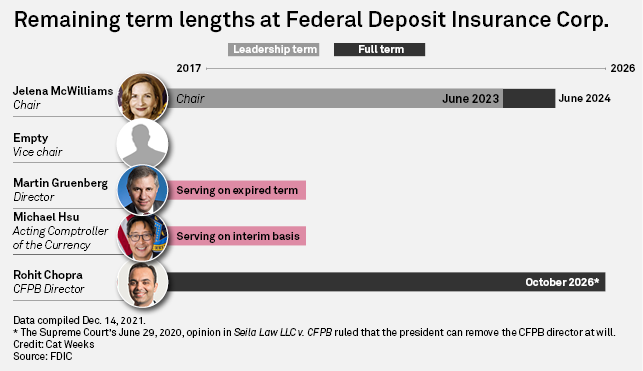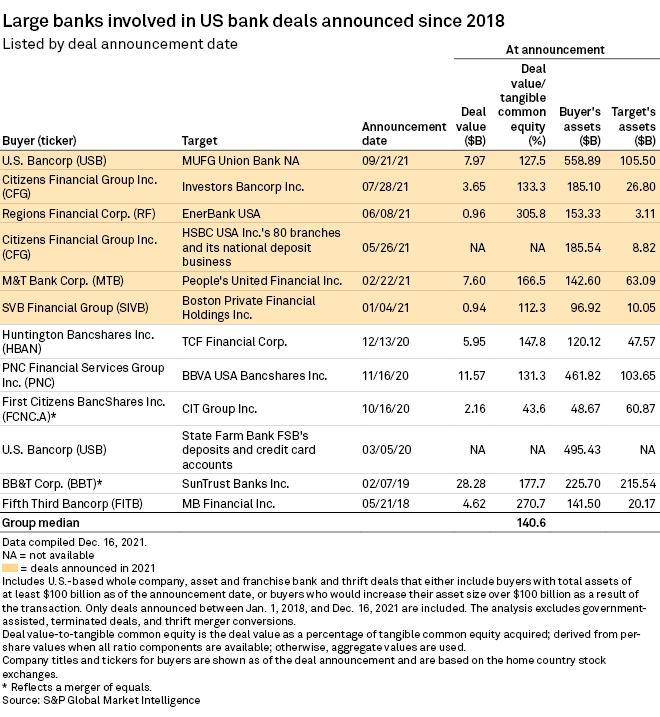S&P Global Offerings
Featured Topics
Featured Products
Events
S&P Global Offerings
Featured Topics
Featured Products
Events
S&P Global Offerings
Featured Topics
Featured Products
Events
Banking & Capital Markets
Economy & Finance
Energy Transition & Sustainability
Technology & Innovation
Podcasts & Newsletters
Banking & Capital Markets
Economy & Finance
Energy Transition & Sustainability
Technology & Innovation
Podcasts & Newsletters
S&P Global Offerings
Featured Topics
Featured Products
Events
17 Dec, 2021
By Zoe Sagalow, Harry Terris, and Zuhaib Gull
The recent partisan clash between regulatory officials over M&A oversight suggests a tougher road ahead for banks seeking to merge.
Democrats on the board of the Federal Deposit Insurance Corp. are seeking to launch a review of merger rules that would focus on questions like whether big acquisitions should be presumed to pose systemic risk concerns and whether banks with records of consumer abuses should be allowed to make acquisitions. The board's sole Republican holdover, Chair Jelena McWilliams, has sought to bottle up the request for public input.
Supporters on both sides have weighed in with sharply worded comments and have claimed the legal high ground in the event of a court case. However it plays out, advisers and analysts say the infighting has added to anxiety across the industry over a regulatory environment for M&A that already appears to have shifted.
"Our clients immediately began asking us how this impacts their pending merger applications and future planning," said John Geiringer, a partner in the Financial Institutions Group at Barack Ferrazzano Kirschbaum & Nagelberg LLP. "The real impact will occur when any final rules are issued, but even proposed rules can create ripple effects among the agencies and within the industry."
Banks had already been looking for a break in what executives described as a backlog of large deal approvals that lawyers and analysts attributed to factors like a July executive order by President Joe Biden calling for updated merger guidelines for banks and tougher scrutiny of deals.
The move by Democrats at the FDIC to launch such a process bolsters the case that the holdup was not just a matter of vacancies in top regulatory posts and gives some signposts to areas of focus for regulators. In a joint statement, board members Martin Gruenberg and Rohit Chopra, who is also director of the Consumer Financial Protection Bureau, called attention to issues like whether there should be stricter standards for mergers that create big banks without "strong track records of performance" and the impact of branch closures on communities.
Acting Comptroller of the Currency Michael Hsu, who is also an FDIC board member, said he supported the request for comment because of the need to address financial stability issues. In a statement, he said merger guidelines are ripe for review and that his focus on financial stability reflects trends in large bank M&A as well as his experience during the 2008 financial crisis.
Aaron Klein, a senior fellow in economic studies at the Brookings Institution, said he is surprised that the FDIC did not act on the executive order sooner.
"The FDIC should engage in requesting this information and engaging the public for thoughts on how to enhance competition in financial services," he said in an email to S&P Global Market Intelligence.

Unprecedented regulatory procedure
According to Gruenberg and Chopra's statement, which was posted on the CFPB's website, the FDIC approved a request for comment seeking public input on the merger review. In another statement the same day, the FDIC said there was no valid vote by its board on the request for comment and that the request had not been approved by the agency for publication in the Federal Register.
Governing documents authorize written voting, and three members voted to publish this request for information, while McWilliams proposed an alternative version, according to a statement on Dec. 14 by Chopra. He added that the general counsel considered the vote invalid "without any legal justification."
The dueling statements by regulators were accompanied by crossfire from senior legislators, creating a capital-wide dust-up that has invited speculation about who will prevail.
"It's highly unusual that agencies air their dirty linens in public," Geoffrey Miller, a professor at New York University School of Law who is an expert on banking law, said in an interview. "It obviously reflects very deep-seated tension."
Miller said he did not know whether the FDIC board members' action was legal because it depends on the agency's internal regulations, while Brian Gardner, chief Washington policy strategist at Stifel, said in a note to clients that litigation may be forthcoming.
"I doubt that it's illegal," Miller said. "It's against etiquette, at a minimum, to do something like this because they're basically accusing their colleagues of playing fast and loose with procedures without quite saying it."
Although the chair controls the agenda, members might have influence and can vote against McWilliams on issues, said Bert Ely, principal at Ely & Co. Inc., a bank consultancy.
"I think they're trying to force her out," Ely said in an interview.
McWilliams could also be outvoted on broker deposit regulations and Community Reinvestment Act issues in addition to merger-related issues, Ely said, adding that he is unsure whether she will want to remain in her post until her term ends in June 2023.
The White House did not respond to requests for comment.

Criticism from trade groups
Trade groups called for clarity on "what constitutes an official action" by federal banking agencies.
"When change comes, it is vital from a governance and regulatory expectations standpoint that federal banking agencies not create ambiguity about what constitutes an official action," the American Bankers Association and the 51 state groups wrote in a joint letter to the FDIC board.
Actions such as this erode the FDIC's independence, according to Tom Quaadman, executive vice president of the U.S. Chamber of Commerce's Center for Capital Markets Competitiveness.
"Partisan actions today that break from well-established precedent will politicize the banking regulations of tomorrow regardless of who is in power," Quaadman said in a statement.
Even if there is a court battle, and the Democratic members lose, they will still have a majority and can use that to block or restructure mergers, Stifel's Gardner, said in a note to clients.
The questions surrounding the request for comment are already creating challenges for banks, said Capital Alpha analyst Ian Katz in a Dec. 14 note.
"The dispute is an additional negative for bank merger applications. Yes, Democratic skepticism on bank mergers has already been clear. But a bitter feud makes it harder for the board to agree on even relatively unremarkable M&A applications," he said.
